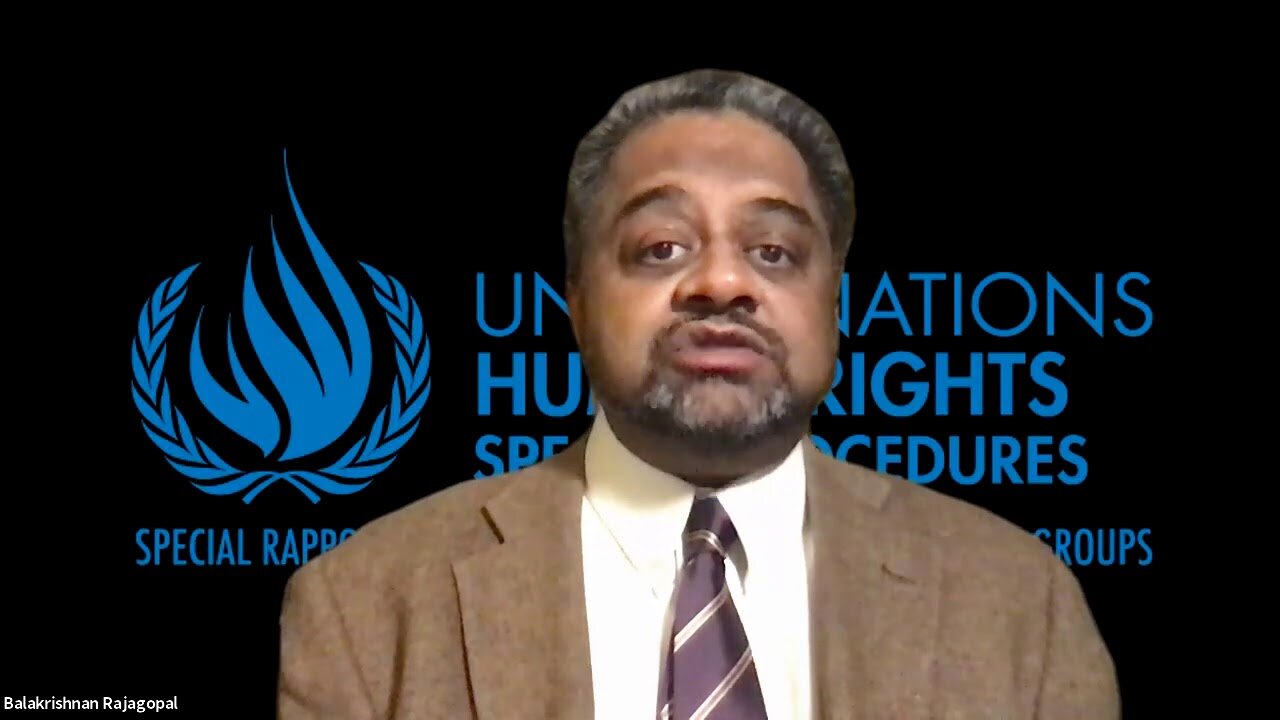'Genocide without any doubt' in Gaza, says UN special rapporteur

Food, water, sanitation and other basic needs are in unprecedented short supply for over one million Palestinians who have fled across the Gaza Strip to the territory’s southern city of Rafah, a UN special rapporteur has told Anadolu.
“More than one million people are concentrated in Rafah, having fled from other parts of Gaza. They are lacking very seriously in the basic necessities of life, from food and water and sanitation with the threat of diseases beyond anything that we have seen in any conflict in recent decades around the world, severe as those conflicts were,” explained Balakrishnan Rajagopal, the UN special rapporteur on the right to housing. “You never had a situation where a population was not even allowed to flee.”
Rajagopal pointed out that even Israel does not know where these people are expected to go, recalling many statements from sources within Israel indicating “a desire to expel them entirely from Gaza.”
Pointing to serious claims that top Israeli officials and other leaders are planning to eliminate the Palestinian population of Gaza, Rajagopal emphasised that these claims, viewed by some as “rantings of random people within Israel” cannot be ignored.
“Unfortunately, everything that we thought was not possible is becoming more and more possible by the day. We have to judge the actions of Israel not by what they say, but by what actually happens. What’s happening is that people have been displaced multiple times, and they have been concentrated in Rafah. They’re being bombed now.”
Underlining how UN rapporteurs have written numerous reports on the “genocidal” dimension of Israel’s attacks in Gaza, Rajagopal noted that they mentioned a “serious risk of genocide” in their initial report. He added that they published another report that included the possibility of ongoing genocidal acts, stating: “Since then, we have confirmed that in fact. What’s happening in Gaza constitutes genocide.”
Commenting on the genocide case brought against Israel at the International Court of Justice (ICJ), Rajagopal said the interim ruling by the top UN court was that South Africa, which filed the charges, was “largely correct” in its petition. “The actions taken by Israel to create conditions where Gaza becomes uninhabitable for the population of people living there, together constitute in my view, acts of genocide, without any doubt.”
Comparing the situation in Gaza to the Bosnian War of the 1990s, Rajagopal pointed out that the ICJ had also ruled that the massacre of Muslim Bosnians by Serb forces in Srebrenica had also amounted to genocide. “During the Bosnian war, in the former Yugoslavia, and in that conflict, about 8,000 to 9,000 people were killed. If that case was genocide, I find it hard to believe that what’s happening in Gaza is not genocide.”
Israeli attacks have killed more than 28,000 Palestinians in the Gaza Strip, mostly women and children.
Highlighting the Gaza issue, said the special rapporteur, represents a “complete failure” of the international community. The mechanism for collective action is completely frozen and the international community has done nothing.
“The UN Security Council or the UN General Assembly have passed very weak resolutions that have not been carried out. Even in a proforma manner, the International Court of Justice ruling, while morally and symbolically an important one, didn’t actually order anything concrete that actually led to specific actions or inactions on the part of Israel.
“Basically, institutionally, I think the world has failed. It has failed Gaza. And once again, Israel has shown that it is protected by what I have been calling an institutionalised impunity. Israel seems to be protected no matter what the transgression.
Pointing out that many buildings in Gaza have been destroyed as a result of the attacks, Rajagopal stated that assessments based on satellite data and field reports show that more than 70 per cent of homes in Gaza have been destroyed or severely damaged, rendered unusable. He noted that data for areas such as Khan Younis in southern Gaza indicates that 82 to 84 per cent of these areas may have been completely wiped out.
“We are talking about a very vast level of destruction, the kind that we haven’t seen in other conflicts, like for example, even in Mariupol, which was the most severely destroyed city by the Russian bombing in Ukraine, or by conflicts in Syria.”
Rajagopal highlighted that homes in Gaza were not only destroyed by bombing or heavy artillery attacks, but also by Israeli forces moving into the bombed areas and destroying homes and public buildings.
He underlined that the reconstruction of Gaza will be extremely challenging and will take years of persistent effort, drawing parallels with the rebuilding of other countries destroyed during conflicts.
“I wonder how long it will take to clear the rubble alone in Gaza. The rebuilding of Rotterdam took almost two decades. That was, by the way, under the most ideal circumstances that we were ready for a very, very significant investment of resources and time to rebuild the place.
“The second thing is more important: Make sure that conditions are established for a sustainable peace in the region before rebuilding can actually happen. Because otherwise, it’s not possible to expect rebuilding to go forward in any meaningful way,” he concluded.
(Source: Middle East Monitor)
